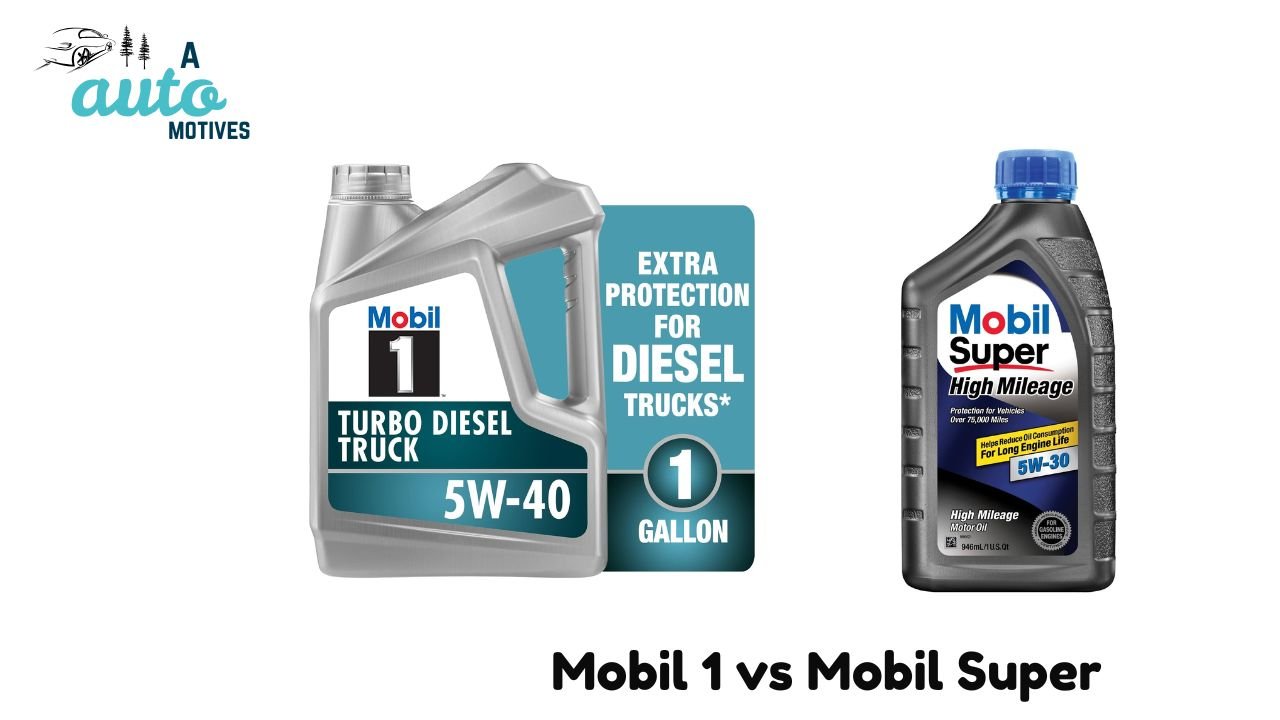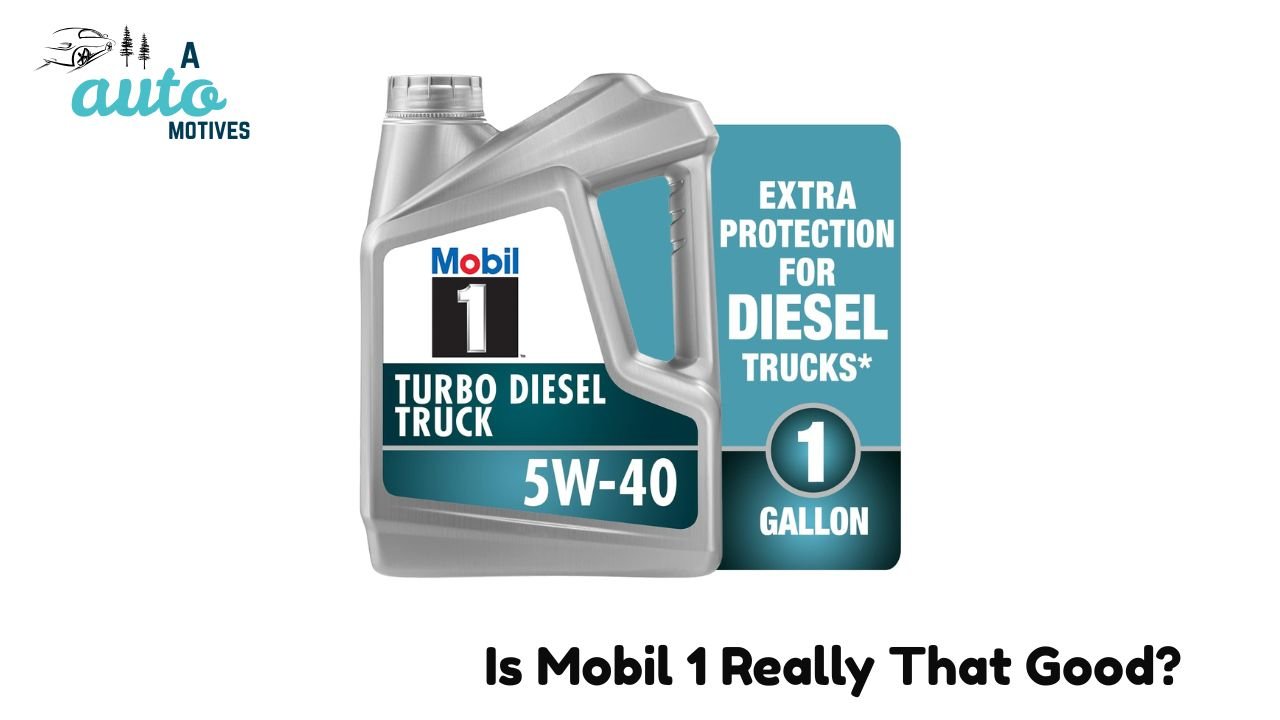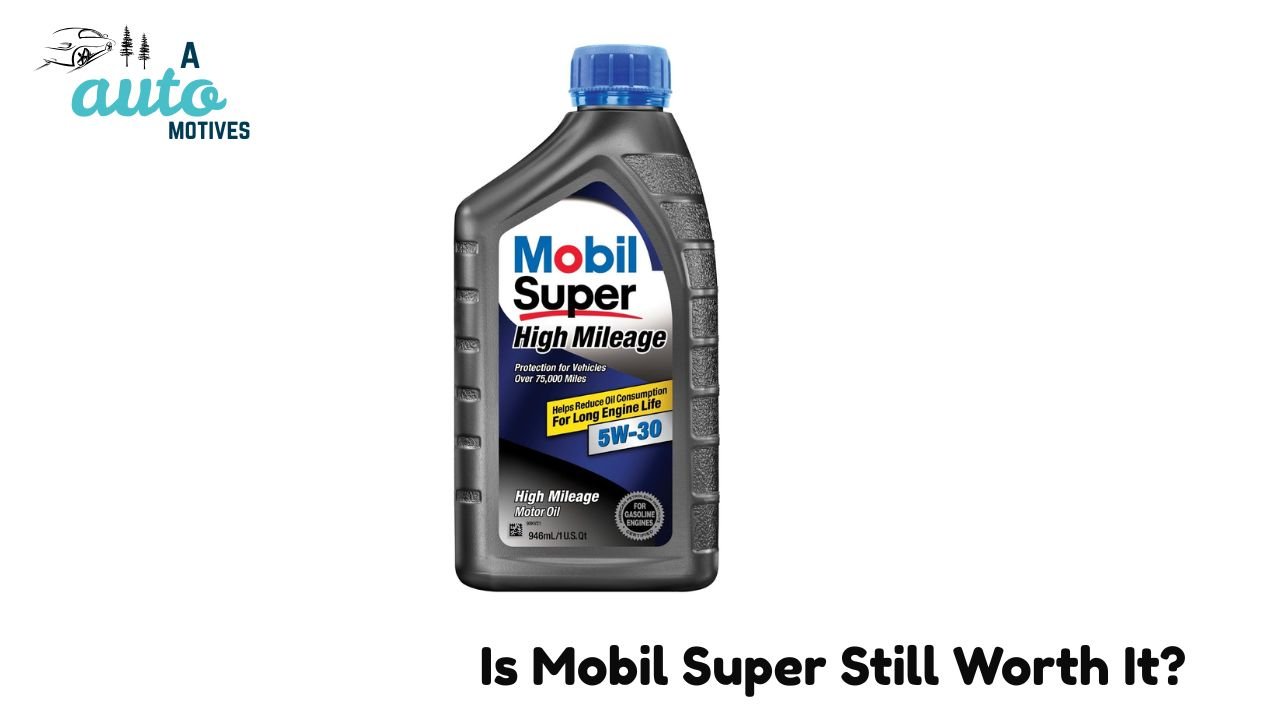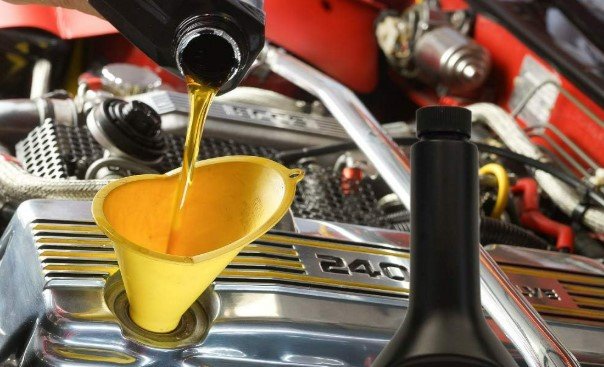Mobil 1 vs Mobil Super – Which One Wins? (My Honest Experience)

Choosing between Mobil 1 and Mobil Super can feel like picking between two equally trusted friends. Both come from the same legendary brand, both promise strong protection—but in practice, they perform quite differently. I’ve spent years driving through the rough highways of Texas, where summer heat can melt your patience, and winters make your car shiver. Through all that, I’ve tested both oils in different vehicles—my daily sedan, an old pickup, and my wife’s compact SUV.
So, after countless oil changes, a few mistakes, and many long drives, here’s my honest, hands-on breakdown of Mobil 1 vs Mobil Super — which one truly wins and why.
Is Mobil 1 Really That Good?

Let’s start with Mobil 1, the one most people call the “gold standard” of motor oils. When I first tried it, I didn’t expect a huge difference. But after a few weeks, I noticed how quiet and smooth the engine became—almost like the car had just rolled out of the showroom.
Mobil 1 is a full synthetic oil, and that makes a huge difference. Unlike regular oils, it’s built molecule by molecule to handle intense heat, long drives, and cold starts. Think of it like a fitness trainer for your engine—it keeps everything running clean and efficient, even under pressure.
One time, I missed my oil change schedule by nearly a month. Life got busy, as it usually does. But surprisingly, my car didn’t complain. No rough starts, no loss of power. That’s when I realized how stable Mobil 1 really is. The oil didn’t break down or lose viscosity like conventional oils often do.
Why Mobil 1 Stands Out
There are several things that make Mobil 1 truly shine:
-
Superior Engine Protection: Even when you push your car hard—long drives, heavy loads, or stop-and-go traffic—it keeps the parts clean and reduces metal-to-metal wear.
-
Cold Weather Performance: Starts up like a dream, even on frosty mornings. You won’t hear that awkward “dry crank” sound.
-
Heat Resistance: On hot summer days, when other oils thin out, Mobil 1 stays stable and keeps its viscosity intact.
-
Extended Drain Intervals: Depending on your car, you can go up to 10,000–15,000 miles between oil changes. That’s peace of mind right there.
-
Cleaner Engine: I’ve opened valve covers after years of using it—and the insides looked spotless. No sludge, no sticky mess.
What Could Be Better
Now, Mobil 1 isn’t perfect. Here’s what I’ve noticed over time:
-
A Bit Expensive: Let’s be real—it costs more than Mobil Super or other blends.
-
Not Ideal for Every Engine: Older or classic engines sometimes respond better to thicker or high-mileage oils.
-
Overkill for Light Use: If you only drive short distances or use your car occasionally, you might not see the full benefit of Mobil 1.
My Verdict on Mobil 1
If you drive regularly—especially on highways or under harsh weather—Mobil 1 is worth every penny. It’s like giving your engine premium-grade health insurance.
I’d recommend it for:
Turbocharged engines
Hybrids
Performance cars
Drivers who want fewer oil changes
If your car manual suggests a synthetic oil, Mobil 1 will likely exceed those requirements.
Check Latest Price and Offer at Amazon
Is Mobil Super Still Worth It?

Now let’s talk about Mobil Super, the oil that quietly wins hearts with its reliability and affordability.
I first tried Mobil Super on my older Toyota Camry—nothing fancy, just a reliable daily commuter. The goal wasn’t performance; I just needed an oil that could handle my 30-minute commute and occasional weekend trips without burning a hole in my wallet.
To my surprise, it delivered more than I expected. The engine idled smoothly, started quietly in cold mornings, and fuel efficiency stayed steady. After a few thousand miles, when I checked the dipstick, the oil still looked clean enough—no burnt smell, no sludge.
That’s when I realized Mobil Super may not be flashy, but it gets the job done.
Why Mobil Super Deserves Respect
Mobil Super is a synthetic blend, meaning it combines synthetic and conventional oil properties. It’s a smart middle-ground—great protection without the full-synthetic price tag.
Here’s what I love about it:
-
Reliable Protection: Keeps your engine clean and smooth even after months of daily driving.
-
Perfect for Older Cars: The high-mileage variant is fantastic for engines with 75K+ miles—it helps reduce leaks and oil burn.
-
Smooth Starts: Even in chilly mornings, Mobil Super flows easily enough to prevent wear.
-
Budget-Friendly: You can save a good chunk of money per change, especially if you do it yourself.
-
Variety of Options: Comes in several viscosity grades (like 5W-30, 10W-30, and 0W-20) to fit most cars.
Where Mobil Super Falls Short
Still, Mobil Super isn’t perfect either. I’ve seen its limitations in tough conditions:
-
Not Full Synthetic: It won’t last as long as Mobil 1, especially under heavy stress.
-
Limited Extreme-Weather Performance: If you drive through extreme heat or freezing cold often, it starts to show its limits.
-
More Frequent Oil Changes: Typically, it’s best to change it around 5,000–7,500 miles, depending on how you drive.
My Verdict on Mobil Super
If you’re on a budget and drive mainly in normal conditions, Mobil Super is a great pick. It offers reliability, smooth performance, and protection that’s well above average for its price.
But if you’re chasing long intervals, extreme performance, or drive in very hot/cold climates—Mobil 1 is the better choice.
Check Latest Price and Offer at Amazon
Mobil 1 vs Mobil Super: Side-by-Side Comparison
Let’s break down how both oils perform in real-world conditions. I’ve compiled this based on my experiences and manufacturer specs:
| Aspect | Mobil 1 | Mobil Super | Winner |
|---|---|---|---|
| Type | Full Synthetic | Synthetic Blend / Conventional | Mobil 1 |
| Viscosity Range | 0W-20, 5W-30, 10W-40, etc. | 5W-30, 10W-30, 0W-20 | Tie |
| Cold Start Flow | Flows instantly in freezing temps | Slight delay in very cold weather | Mobil 1 |
| High Heat Stability | Excellent – retains viscosity | Good, but thins faster | Mobil 1 |
| Longevity | Up to 15,000 miles | 5,000–7,500 miles | Mobil 1 |
| Engine Cleanliness | Keeps engine spotless | Prevents sludge decently | Mobil 1 |
| Price | Higher | More affordable | Mobil Super |
| Best For | Performance & long trips | Daily commutes & older cars | Depends on needs |
Both oils have their own fan base—and rightly so. If I had to describe them in simple terms:
Mobil 1 is the athlete—built for endurance, performance, and consistency.
Mobil Super is the hard worker—reliable, affordable, and always ready to go.
Additive Technology Comparison
One big difference lies in additive chemistry—the stuff inside that protects your engine. Mobil 1 is loaded with top-tier detergents, anti-wear agents, and friction modifiers.
When I used Mobil 1, my oil filter always came out cleaner than usual. That means less sludge, less carbon buildup, and better long-term engine health.
Mobil Super, on the other hand, also includes strong detergents—but since it’s a blend, the additives don’t last as long under stress. You’ll likely need to change the oil more often to keep performance steady.
| Feature | Mobil 1 | Mobil Super |
|---|---|---|
| Detergent Power | Strong – keeps engine spotless | Moderate – effective short-term |
| Anti-Wear Additives | Excellent, protects at high RPMs | Good for regular driving |
| Friction Modifiers | Reduces drag and improves MPG | Limited impact |
| Oxidation Resistance | Very High | Moderate |
From a chemical standpoint, Mobil 1 clearly leads. But in everyday driving, especially if you stick to regular oil changes, Mobil Super can still give you plenty of protection for the price.
Fuel Efficiency & Real-World Driving Experience
Fuel economy might not be the first thing on your mind when buying engine oil—but trust me, it matters. Even a small difference can add up over months of commuting.
When I switched from Mobil Super to Mobil 1 in my daily driver, I noticed around a 2–3% bump in MPG. It wasn’t magic, but it was noticeable. My car felt lighter, the throttle response smoother, and acceleration slightly more effortless. That’s because Mobil 1’s synthetic formula reduces friction between engine parts, helping your car use less fuel to move the same distance.
With Mobil Super, things were still fine. It didn’t harm mileage, but it didn’t improve it much either. The synthetic blend does a decent job of reducing friction, but the improvement is modest.
So, if you’re someone who drives long distances or just loves squeezing every drop of efficiency from your tank, Mobil 1 is your pick. For city driving and short trips, Mobil Super will serve you just fine.
Temperature Performance: Hot vs Cold
Temperature extremes test any oil’s true strength. I live in an area where it can hit 105°F in summer and drop close to freezing in winter. That’s a torture test for any engine oil.
Mobil 1 handled it like a champ. In hot weather, it stayed stable—no burning smell, no drop in oil pressure, no sluggish performance. The viscosity held strong even after hours of driving. In the winter, the car started immediately—no grinding, no slow crank, just a smooth hum.
Mobil Super, while solid, struggled a little more in these extremes. On very cold mornings, it took a few seconds longer to circulate fully. And during summer road trips, I noticed the oil got thinner faster, especially after pushing the car uphill for hours.
For moderate climates, Mobil Super works great. But for harsh weather—whether you’re in the Arizona desert or the cold hills of Montana—Mobil 1 wins hands down.
Longevity: How Long Does Each Last?
Here’s the real-world difference: Mobil 1 easily goes up to 10,000–15,000 miles before needing a change. That’s almost double the lifespan of Mobil Super, which typically needs replacement around 5,000–7,500 miles.
On paper, that sounds simple—but in practice, it makes a big difference. With Mobil 1, I could take long road trips without worrying about the next oil change. It’s designed for extended drain intervals, meaning fewer maintenance stops and more peace of mind.
Mobil Super, being a blend, doesn’t have that same endurance. It’s great for city use and short commutes but isn’t meant to stay in your engine for months on end.
In the long run, if you consider cost per mile, Mobil 1 can actually save you money, even though it’s more expensive upfront.
Engine Protection Over Time
Let’s talk about what really matters—how well these oils protect your engine after years of use.
After running Mobil 1 for nearly 80,000 miles in my Chevy Malibu, I noticed less wear on critical parts. The valve train stayed clean, the oil didn’t darken too quickly, and the engine still had that “new car smoothness.”
Mobil 1’s anti-wear additives (like zinc and molybdenum compounds) do an incredible job at minimizing metal-to-metal friction. That’s why performance cars, turbo engines, and hybrids all benefit from it.
Mobil Super, on the other hand, does well for daily commuting and family cars. It’s designed to prevent sludge and keep engines clean, but it can’t maintain that protection for as long under tough driving conditions. If you change it on time, though, you’ll still enjoy a healthy engine life.
Bottom line: Mobil 1 is built for longevity and heavy use. Mobil Super is built for practicality and affordability.
Price Comparison: What You’re Really Paying For
Let’s talk dollars and sense.
At most auto shops or on Amazon, Mobil 1 costs around 30–40% more than Mobil Super for the same quantity. That might seem steep at first—but when you consider you’ll be changing it half as often, the math starts to work in Mobil 1’s favor.
Here’s a quick example:
| Oil Type | Price (5 Quarts) | Average Change Interval | Estimated Cost per Mile |
|---|---|---|---|
| Mobil 1 Full Synthetic | $35 | 10,000–15,000 miles | $0.0025/mile |
| Mobil Super Synthetic Blend | $25 | 5,000–7,500 miles | $0.0033/mile |
So while Mobil 1 feels premium, it’s not necessarily more expensive in the long run.
Still, if you’re on a tight budget or maintain multiple vehicles, Mobil Super remains a very smart buy—it gives dependable performance at a price that’s hard to beat.
Final Recommendation: Which One Should You Pick?
After years of testing both oils in various cars, climates, and driving conditions, here’s how I’d sum it up:
Choose Mobil 1 if:
-
You drive long distances or in extreme weather.
-
You own a turbo, hybrid, or newer car model.
-
You want fewer oil changes and top-tier protection.
-
You value performance and smoothness over price.
Verdict: Mobil 1 is the winner for those who want the best long-term engine protection and reliability.
Choose Mobil Super if:
-
You’re on a budget and do regular oil changes.
-
You drive mostly in the city or mild climates.
-
You have an older or high-mileage car that doesn’t need synthetic oil.
Verdict: Mobil Super is the perfect balance of affordability and everyday performance.
If Mobil 1 is the marathon runner, Mobil Super is the dependable daily walker—steady, practical, and always ready for another trip.
Final Ratings
| Category | Mobil 1 | Mobil Super |
|---|---|---|
| Engine Protection | ⭐⭐⭐⭐⭐ | ⭐⭐⭐⭐ |
| Longevity | ⭐⭐⭐⭐⭐ | ⭐⭐⭐ |
| Cold Weather Performance | ⭐⭐⭐⭐⭐ | ⭐⭐⭐⭐ |
| High-Heat Stability | ⭐⭐⭐⭐⭐ | ⭐⭐⭐ |
| Price Value | ⭐⭐⭐⭐ | ⭐⭐⭐⭐⭐ |
| Overall Score | 9.5/10 | 8.5/10 |
Final Thoughts
If you ask me which one wins, my answer is simple:
Mobil 1 wins in performance, longevity, and protection.
But the truth is, both oils are excellent in their own right. Mobil Super is perfect for everyday driving, tight budgets, and older vehicles. Mobil 1 is the choice when you want to give your engine the absolute best—especially if you drive in tough conditions or plan to keep your car for years.
I’ve used both, and I still do—Mobil 1 for my newer SUV, and Mobil Super for my old reliable sedan. That’s the beauty of it. You can’t really go wrong with either; it just depends on what you value more—premium performance or practical savings.
FAQs: Mobil 1 vs Mobil Super
Q1. What’s the main difference between Mobil 1 and Mobil Super?
Mobil 1 is a full synthetic oil made for high performance and longevity. Mobil Super is a synthetic blend focused on affordability and regular protection.
Q2. Which is better for older cars?
Mobil Super High Mileage is great for older engines—it helps reduce leaks and oil burn. But Mobil 1 High Mileage offers even stronger long-term protection if you can afford it.
Q3. Can I switch between Mobil 1 and Mobil Super?
Yes, you can switch between them as long as the viscosity matches your car’s recommendation (like 5W-30).
Q4. Which oil handles extreme temperatures better?
Mobil 1 performs better in both extreme heat and cold due to its fully synthetic formulation.
Q5. Does Mobil 1 improve fuel economy?
Yes, many users (including me) have noticed a slight boost in fuel efficiency thanks to lower friction levels.
Q6. Is Mobil Super good for city driving?
Absolutely. For short commutes, regular traffic, and mild weather, Mobil Super does the job perfectly.
Final Verdict:
If your goal is top performance, fewer oil changes, and peace of mind—Mobil 1 takes the crown.
If you just want dependable oil that keeps your car running smoothly without overspending—Mobil Super is your hero.
Check the latest prices and offers on Amazon to see which fits your car and budget best.






